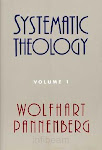I have decided to continue my studies and reapply (back) to the University of Helsinki. In my thesis I studied John Paul II's theology of the body. In my dissertation I hope to enter one of the many doors opened by my thesis and focus on theology of love. The exact topic needs to be ratified by my professors, but I'm hoping that I'll be able to conduct a comparative study between the conceptions of love (theologies of love) of two great minds: John Paul II (Catholic) and C. S. Lewis (Anglican/Protestant).
The topic, on one hand, is superbly interesting, but on the other, superbly terrifying. I am not just referring to the academic dimension in conducting a study of this scale. What terrifies me is the topic itself: love. Let me explain.
It is an age old question whether knowledge or virtue constitutes the essence of a good life. What is the relationship between knowledge and virtue? When we say we "understand a thing", is it by virtue of knowledge or by virtue of virtue that we do understand? After analyzing the question deeper, many would conclude that the answer is both. And that knowledge and virtue, at the end of the day, are organically connected to one another. But what does this have to do with a systematic study on love?
Nowhere is this interconnectedness between knowledge and virtue more apparent than in love.
This poses a serious limitation for any study of love, a two-part limitation. Firstly, a true understanding of love requires not only knowledge of love, but also love itself, love as a virtue. The true studier of love must be a true lover. Otherwise we are dealing with superficialities. The innermost secrets of love reveal themselves to the scholar-lover more than to the scholar. Thinking about love is not a substitution for loving.
I believe both John Paul II and C. S. Lewis to be scholar-lovers par excellence, so the content their lover-minds produced is most likely of superior quality. So they are excellent sources. However, if the studier of their thought is himself not well versed in the school of love, this superior quality will not be penetrated.
The second part of the two-part limitation follows the same logic. Somehow the findings of a study of love -- a study which for argument's sake we take as successful -- must be communicated to the public, to the readership. By virtue of all what's been said of knowledge and virtue (in understanding), the deeper findings of the study will be comprehensible only to the lovers.
So I'm anxious firstly because the chances of conducting a successful study are slim and the topic, love, obligates the serious researcher to attempt something of a conversion of heart; and secondly because, presuming the study is successful, the topic, love, obligates the serious reader to attempt something of a conversion of heart.
A difficult situation. Yes, but what could be more important than love? I think I am the luckiest person alive if my study plans are ratified.
"We must remember that love reveals itself, not by words or phrases, but by action and experience. It is Love which speaks here, and if anyone wishes to understand it, let him first love." -- Bernard of Clairvaux
3 weeks ago







2 comments:
so in a way there is no way you can keep this an objective study. how very postmodern of you ;)
or premodern!
hehe. a great decision! may it be guided and inspired!
To oversimplify: I'd say premodern rather than postmodern, because the great minds of old believed in objective reality apart from subjective mind, and/but never doubted the subjective mind's ability to grasp objectivity. Whereas postmodernism disbelieves the first and doubts the second. ;-)
Thank you! I'll keep you posted.
Post a Comment